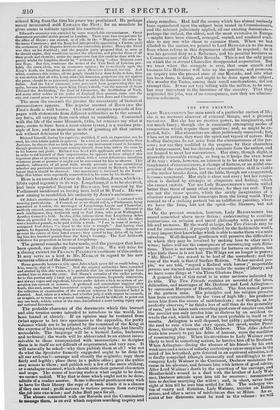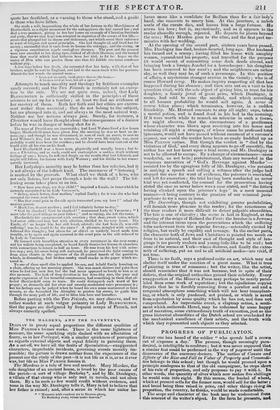TI1E TWO FRIENDS.
LADY BLESSINGTON has seen much of a particular section of life; she is an accurate observer of external things, and a pleasant raconteur. But she has no creative power, no imagination, and
not much fancy though site is constantly attempting modes of composition which rsquire these qualities; and, as might be ex- pected, fails. Her characters are often judiciously conceived; but, when set in action, they want the spirit and vigour of nature. Her leading dialogues do not arise from the circumstances of the per-
sons ; nor are they modified in the progress by their characters and temperament, but too obviously emanate from the author, and are framed to meet her convenience. Her story, though slight, is generally reasonable enough, as long as it keeps the even tenor of its way : when, however, an interest is to be excited by an en- tauglement of circumstances, a change of fortune, or an artful sus- pension of the catastrophe, her want of constructive skill is visible —the author breaks down, and the fable, though not exaggerated, becomes unnatural. Her style is clear and easy ; but her compo- sition is dashed by attempts at eloquence and feeling, which she cannot sustain. Yet are Lady Beessitecrosis novels withal better than those of many other writers; for they are real. They are not the ranee species, which the sickly imagination of a closeteer conjures up, but transcripts from the living world. They remind us of a striking portrait but an indifferent painting, where we have the form, but not the spirit—the likeness, but not the life.
On the present occasion, however, Lady BLESSINGTON has soared somewhat above mere fiction; endeavouring to combine instructions on religion and moral philosophy with a picture of life and manners. By the world at large, the Two Friends may be read for amusement; if properly studied by the fashionable world, it may impart that knowledge which is able to make them wise unto salvation. Well-disposed gentlemen will perceive the difficulties in which they may be involved by making love to other men's wives; ladies will see the consequence of encouraging such flirta- tions. There is not much opportunity for lectures on politics, but what little there is is not lost. The Whigs are no longer in power; "Mr. Manly" has ceased to be lord a the ascendant; and the tone of the work is that of Surface Reform. "Sober-minded peo- ple," we are told, "regard a Radical with horror ;" respectable persons are warned against licence under the name of liberty; and we have some flings at "the Three Glorious Days." A general idea of this novel is in some measure indicated by its title. The Two Friends contains an account of the loves, difficulties, and marriages of Mr. Desbrow and Lord Arlington— by succession Marquis of Heatherfield. The first-named person is the pattern man. His principles and his religion preserve him from contamination by the vices of high life ; his prudence saves him from the snares of matchmakers ; and though, as he modestly observes, " he thinks less of self than do the generality of men, yet he takes such exceeding good care of number one, that the novelist can only involve him in distress by an accident to- wards the end, which is none of the most probable in itself or its results. Arlington is well disposed, but giddy; galloping along the road to ruin when the story opens, but saved, under Provi- dence, through the means of Mr. Desbrow. This jidus Ac/tales lends him money to pay his debts of honour, upon the condition of renouncints" play. When his attentions to Lady Walmer seem likely to lead to something serious, he hurries him off to Scotland. When Arlington—during the absence of his friend—by his own weakness awl a series of unlucky contretemps raises suspicion in the mind of his betrothed, gets detected in an equivocal situation, aad is finally compelled (though innocently and unwillingly) to ac- company Lady Weimer to the Continent, Desbrow maintains his cause in his absence, and favours him with letters of good advice. After Lord Walmer's death by the upsetting of his carriage, and Heatherfteld's wound in a duel with the brother of Lady Wei- mer, Desbrow attends upon hiin till he recovers ; recommends him to decline marrying the widow' and, in short, never loses sight of him till he sees him settled for life. The unhappy vic- tim of vanity and flirtation, Lady Walmer, marries an Italian prince, and after a series of misfortunes dies at Milan. An ac count of her distresses must be read in the volume: we will
quote her deathbed, as a warning to those who stand, and a guide to those who have fallen.
She made a will, bequeathing the whole of her fortune to the Marchioness of Heatherfield, as a slight atonement for the unhappiness she had caused her ; and
died a true penitent, giving in her last hours an example of Christian fortitude and piety, that we may hope was accepted in expiation of the errors of her life,— errors that plunged her in shame and dishonour, and which owed their existence to want of religion and moral principles. She had thought of, and lived but for society ; unmindful that it casts from its bosom the unhappy, and the erring, an a vigorous constitution repels contagious diseases. The past and the present were now unveiled to her dying eyes, robbed of all their illusions, and she turned from that world which had hitherto been her idol, to fix he: hopes on the mercy of Him who can pardon those sins that Ms fallible creatures condemn without pity. A few days before her death, she entreated that her body, vi Mt that of her brother, might be sent to England, and laid in the same tomb' with her parents. Almost the last words she uttered were-
" Lean not on earth, 'twill pierce thee to the heart,— A broken reed at best, but oft a spear."
Attempts to teach morality and theology by fictitious examples rarely succeed; and the Two Friends is certainly not an excep- tion to the rule. We are not quite sure, indeed, that Lady BLESSINGTON is sufficiently skilled in the principles of these sciences to set up for a teacher; at least we find no evidence of her mastery of them. Both her faith and her ethics are excres- cent rather than essential ; they do not belong to the subject, but are plumped into it, and not always in the most natural way. Neither are her notions always just. Surely, for instance, a Christian would have thought about the consequences of a liaison before he was in danger of being shot for it.
The ways of Providence are inscrutable; had Lord Wahner lived a few hours longer, Ileatherfield must have given him the meeting he was so bent on de - raano:ng ; and though he was determined, in case of such an event, to rem:ye Lord Walmer's fire, but not to return it, still his own life might, nay, most probably would have been the sacrifice ; and he should have been sent out of the world with all his sins on his head.
Lord Heatherfield was a brave man, physically and morally brave ; but he as a Christian' and as such, could not contemplate a sudden death without feelings of awe; hence, he reflected deeply on the results that had followed, and might still follow, his liaison with Lady Waliner ; and his dislike to her conse- quently increased.
Her Ladyship's morality may be better than her religion, but it is not always of the loftiest kind. The meanness of "listening " is marked by the proverb. What shall we think of a hero, who not only listens, but peeps through a hole in the wall ? The fol- lowing scene takes place at an inn.
" How have you slept, my dear child?" inquired a female, in tones which he instantly recognized to be Lady Vavasour's.
" Better, much better, dear mother," replied Emily; for it was she who had occupied the room next his. " Has that cruel pain in the side again tormented you, my love ? " asked the anxious parent.
" Much less, dearest mother ; and! feel infinitely better to-day."
" God be thanked ! (;od be thanked ! " murmured Lady de Vavasour ; "I must take the good tidings to your father ; " and so saying, she left the room. Beatlierfield- felt overpowered with emotion ; that dear, sweet voice, which Lad never addressed him but with affection, thrilled to his very heart. his Emily, ah ! no longer his, but still loved, adored ; she had been ill, was still suffering ! was he, could Ire be the cause ? A pleasure, mingled with sadness, followed this thought ; but alarm for an object so tenderly loved made him tremble, as he again and again recurred to the cruel pain in the side referred to by Lady de Vavasour. He listened with breathless attention to every movement in the next room; and her toilette being completed, he heard Emily dismiss her femme de chambre, with instructions to return in half an hour. He rose from his bed with noise- less step ; and, his room being still darkened, he perceived the light coming in from some chinks in the aperture of the ill-jointed boards of the partition, which, in distending, had broken sundry small cracks in the paper which co- vered it.
To one of these small slits he applied his eye, and beheld Emily kneeling on a chair, offering up her morning prayer. She was Much thinner and paler than when he had last seen her, but she had never appeared so lovely to him as at tins moment. The look of deep devotion in her dove-like eyes, the pure and angelic expression of her beautiful countenance, had something in them that af- fected Ileatherfield even to tears. He could distinguish each word of her prayer ; so distinctly did her clear and sweetly-modulated voice pronounce it ; but his feelings may be judged when he heard his own name murmured in faint accents, as she beseeched the Almighty to pardon his errors, to guide him through the mazy path of life, and to bless him here and hereafter.
Before parting with the Two Friends, we may observe, and we rather wonder at such vulgar pedantry in Lady BLESSINGTON, that the pages are disfigured by frequent scraps of French, not always correctly spelled.




























 Previous page
Previous page